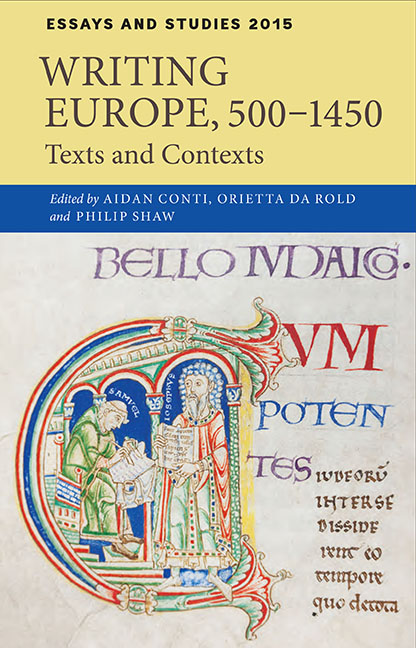Book contents
- Frontmatter
- Contents
- List of Illustrations
- Notes on Contributors
- Preface
- Acknowledgments
- List of Abbreviations
- Medieval Manuscript Studies: A European Perspective
- The DigiPal Project for European Scripts and Decorations
- Italian Giant Bibles: The Circulation and Use of the Book at the Time of the Ecclesiastical Reform in the Eleventh and Twelfth Centuries
- Isolation or Network: Arengas and Colophon Verse in Frisian Manuscripts around 1300
- Writing the Germanic Languages: The Early History of the Digraphs
, and The New Heathens: Anti-Jewish Hostility in Early English LiteratureLatin Composition in Medieval NorwayTranslating Europe in Medieval WalesCharms among the Chants: Verbal Magic in Medieval Bulgarian ManuscriptsIndexMedieval Manuscript Studies: A European Perspective
Published online by Cambridge University Press: 11 June 2021
Book contents- Frontmatter
- Contents
- List of Illustrations
- Notes on Contributors
- Preface
- Acknowledgments
- List of Abbreviations
- Medieval Manuscript Studies: A European Perspective
- The DigiPal Project for European Scripts and Decorations
- Italian Giant Bibles: The Circulation and Use of the Book at the Time of the Ecclesiastical Reform in the Eleventh and Twelfth Centuries
- Isolation or Network: Arengas and Colophon Verse in Frisian Manuscripts around 1300
- Writing the Germanic Languages: The Early History of the Digraphs , and
- The New Heathens: Anti-Jewish Hostility in Early English Literature
- Latin Composition in Medieval Norway
- Translating Europe in Medieval Wales
- Charms among the Chants: Verbal Magic in Medieval Bulgarian Manuscripts
- Index
Summary
WHEN JEAN MALLON wrote his seminal treaty on Roman palaeography, he pointed out that the field is so large that scholars cannot be expected to explore it in detail. All one can do, he argued, is wander; however, after getting lost in a minefield of information, a scholar will always come back with something tangible. It is equally difficult to define what contemporary medieval manuscript studies represent in Europe. The literature on the subject is obviously vast, and it is impossible to offer a thorough survey of the wide field it covers. It is, however, equally true that confronting ideas and practices across international and national borders may lead to profitable new research initiatives.
The ways in which scholars think about medieval manuscripts are as multifaceted as the taxonomies used to define the discipline, and scholarly practices vary across international and national borders. In the anglophone world, ‘manuscript studies’ is understood as an interdisciplinary endeavour, which started with the great effort of cataloguing manuscripts in British collections, and now intersects with a wide range of other disciplines from literary studies to textual transmission and editing, art history, history, cultural studies and sociology. Other concerns in the field include detailed considerations on the dissemination, circulation and reception of books, the development of medieval libraries, the growth of manuscript collections and the history of reading. In Europe, the terms palaeography and codicology are often called upon to denote and define the study of the medieval manuscript. Codicology is sometimes understood as an ancillary component of palaeography, when its independence is not categorically denied. In other contexts, the word codicology is used instead to indicate the study of the manuscript book as a whole, including, for example, matters relating to the history of handwriting. More specific terms such as archaeology of the book, material codicology or – more recently – structural codicology have been introduced to emphasise the focus on the study of materials and to describe the physical structure of the medieval book. These different labels will be used conventionally in the following pages as a common thread to navigate the most relevant and promising research trends, starting with a short overview on manuscript studies.
- Type
- Chapter
- Information
- Writing Europe, 500-1450Texts and Contexts, pp. 1 - 24Publisher: Boydell & BrewerPrint publication year: 2015
- 1
- Cited by
Save book to Kindle
To save this book to your Kindle, first ensure coreplatform@cambridge.org is added to your Approved Personal Document E-mail List under your Personal Document Settings on the Manage Your Content and Devices page of your Amazon account. Then enter the ‘name’ part of your Kindle email address below. Find out more about saving to your Kindle.
Note you can select to save to either the @free.kindle.com or @kindle.com variations. ‘@free.kindle.com’ emails are free but can only be saved to your device when it is connected to wi-fi. ‘@kindle.com’ emails can be delivered even when you are not connected to wi-fi, but note that service fees apply.
Find out more about the Kindle Personal Document Service.
- Medieval Manuscript Studies: A European Perspective
-
- Book: Writing Europe, 500-1450
- Online publication: 11 June 2021
×Save book to Dropbox
To save content items to your account, please confirm that you agree to abide by our usage policies. If this is the first time you use this feature, you will be asked to authorise Cambridge Core to connect with your account. Find out more about saving content to Dropbox.
- Medieval Manuscript Studies: A European Perspective
-
- Book: Writing Europe, 500-1450
- Online publication: 11 June 2021
×Save book to Google Drive
To save content items to your account, please confirm that you agree to abide by our usage policies. If this is the first time you use this feature, you will be asked to authorise Cambridge Core to connect with your account. Find out more about saving content to Google Drive.
- Medieval Manuscript Studies: A European Perspective
-
- Book: Writing Europe, 500-1450
- Online publication: 11 June 2021
×



